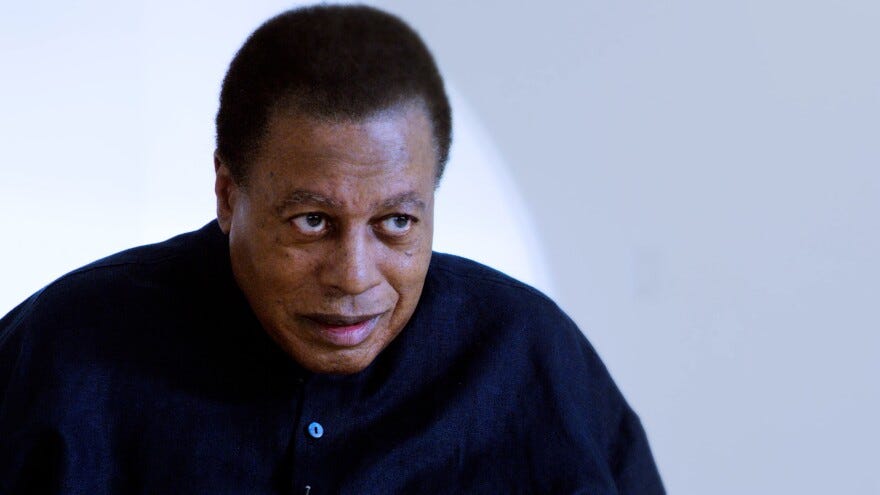Last Friday, Blue Note Records launched the first of a planned series of archival releases around the work of Wayne Shorter. The composer and saxophonist, who died in March of 2023, was associated with the label off and on for nearly 60 years – from the early rumblings of hard bop through Shorter’s galvanic modal compositions for small group in the mid ‘60s, up to the late-career quartet he formed in 2000.
Celebration Volume 1 captures that late group – with Shorter playing tenor and soprano saxophone (and doing some strategic whistling) alongside pianist Danilo Perez, bassist John Patitucci and drummer Brian Blade – in performance at the 2014 Stockholm Jazz Festival. The set that night included several pieces that were staples of the band’s repertoire – Shorter’s tune “Lotus,” his interpolation of the Irish folk song “She Moves Through the Fair” – alongside five excursions that were composed on the spot by the quartet. These share a naming convention but are distinct pieces: The album opens with “Zero Gravity to the 15th Dimension,” later comes “Zero Gravity to the 11th Dimension” and so on.
The headline here: Pay attention. Even if you already know you won’t take the 19-minute ride through “Lotus” because it’s too long, even if the music doesn’t groove like your best beloved jam band grooves, if you care about the evolution of music, you need to know that this music exists. As a beacon of creativity, a study on the cultivation of pure instantaneous possibility, and an example of how far four players who share an unusual collective sensitivity – and a profound predisposition to openness – can travel in the course of an ordinary night on a tour.
Shorter is arguably the most influential composer in jazz history; his elegant miniatures connect melodies of declarative beauty to impossibly rich and endlessly stretchy harmonies. The musicians of his late quartet showed up for work having studied Shorter’s tunes during their formative years. They were default-shaped by his language. They absorbed his ideas about tension and release, and not resolving chords in the typical ways.
But as Patitucci has said in interviews (with me and others), that scholarship didn’t (couldn’t!) prepare them for the gig. Because as Celebration makes clear, Shorter’s ethos was not about what the musicians bring with them to the stage: It’s about what they might discover and then develop, together, when they get there.
The enduring contribution of this group: It applied Shorter’s deep compositional aesthetic to the act of in-the-moment collective seeking.
The quartet evolved modes of listening that prioritize the poignance of open space over interstitial chatter; its best moments here and on other recordings evolve as though scored by an unseen hand. The music centers on a spirit of play and “what happens if….?” that requires each musician to calibrate the conversational volleys according to subtle shifts in the wind. A thrill of watching this band live was witnessing the players responding to each development as the music unfolded, shifting between foreground and background, pulling some narrative threads while discarding others. There is no text governing the “Zero Gravity” pieces, yet it often sounds that way – they move like stories. In much the same way, themes as simple as the four-note opening of “Orbits” blossom into elaborate cascades of interconnected ideas. Some are gorgeous, some preposterous. All are related to the exploration in progress — it’s called Celebration but it could just as accurately have been titled Inquiry.
And though all four musicians are instrumental wizards, these discourses rarely involve marvels of technique: Instead, they’re essays on perspective. They have the steady gaze of a mounted camera circling an object in slow motion, in a kind of tempoless trance. The goal isn’t necessarily to arrive at a final perfectly clarified image; with Shorter’s group, the lure is the deliberate, engrossingly interactive process of uncovering.
This prevails throughout Celebration, from the out-of-thin-air Zero Gravity creations to a disarmingly “straight” reading of “Edge of The World (End Title)” written by Arthur B. Rubinstein for the 1983 film War Games. Shorter evidently loved this melody; he interprets it on soprano saxophone with great restraint, avoiding embellishment and playing to heighten the theme’s fragility. The trio behind him responds in kind. They walk to the edge of a vividly imaginable canyon in a measured and reverential cadence. When they peer over the side, what they see is something that’s quiet and picturesque, a galaxy away from frenetic mile-a-minute high-density jazz: The graceful trajectory of a lone bird, surveying the possibilities while staying true to the plaintive theme.




This is a really deep album. Good take on it here. Cheers.
Wonderful piece that explains the importance of Wayne Shorter.